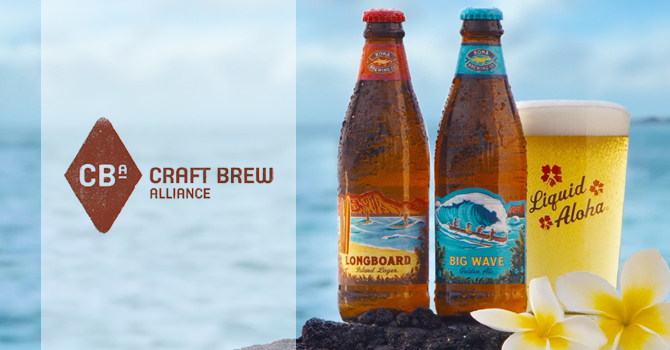
In what was promised as not “a routine earnings call,” Craft Brew Alliance CEO Andy Thomas expressed enthusiasm for his company’s proposed sale to Anheuser-Busch InBev, which already owns 31.2% of the company.
“In stark contrast to the disappointment that I expressed in a public conference call with many of you on September 5, on behalf of management, I can enthusiastically say that we are nothing but excited about our announced transaction with Anheuser-Busch,” Thomas said Wednesday during CBA’s third-quarter earnings conference call with investors and analysts.
CBA and the world’s largest beer manufacturer announced jointly on Monday that A-B would acquire the remaining 68.8% of CBA for $16.50 per share, just three months after declining to make a qualifying offer of $24.50 per share. The deal is expected to close in 2020, pending governmental and shareholder approvals.
Thomas said on the call that CBA’s leadership is pleased with both the deal and the share price, which he said proved “real and certain value” for CBA shareholders. The acquisition plants CBA’s brands — Kona Brewing, Widmer Brothers, Redhook, Wynwood, Cisco Brewers, Appalachian Mountain Brewery, Omission, Square Mile Cider and the pH Experiment — in A-B’s Brewers Collective, the craft division A-B has curated through acquisitions over the past decade that includes Goose Island, Elysian, 10 Barrel, Golden Road, Wicked Weed, among others.
“Our brands will join forces with an already outstanding craft portfolio within Anheuser-Busch’s Brewers Collective, complementing the existing Brewers Collective brands and benefitting from the opportunity for greater resourcing, increased support and additional focus,” Thomas said.
In his discussion of CBA’s sales in the third quarter, which were announced Tuesday, Thomas called it “candidly, a mixed bag.” Kona, consistently the top-performing horse in CBA’s stable, outsold the rest of CBA’s brands and outperformed the beer category as a whole.
Kona’s depletions (sales-to-retailers) grew 7% in Q3 and 6% through the first nine months of 2019. Total CBA depletions grew 2% in the quarter. Shipments (sales-to-wholesalers) were flat for Kona and decreased 2% for the total portfolio, due to Kona out-of-stock issues over the summer.
“Simply laid out, out-of-stocks at the end of Q2 and the beginning of Q3 led to higher-than-desirable wholesaler inventories as beer shipped in Q2 never made it to fill those empty shelves,” Thomas said. “As a consequence, to safeguard quality and the work we’ve done to right-size wholesaler inventories, Q3 shipments were subsequently suppressed, leading to the negative one-two punch of lower revenue and volume deleveraging in the breweries and supply chain.”
Another bright spot in CBA’s portfolio was Wynwood Brewing’s La Rubia Blonde Ale, which grew 31.9% in Q3 and jumped into the top 10 craft beer brands in its home market of Miami. Outside of Florida, La Rubia is being introduced as a stand-alone brand and launched in New York and Connecticut last month, CMO Ken Kunze said.
Wynwood, Cisco and Appalachian Mountain, which CBA acquired smaller stakes of earlier in the decade but bought out completely in October 2018, were up a combined 2% for the quarter, Kunze said.
According to Thomas, data collected in Q3 for beer and hard seltzer hint at a coming shift in purchasing habits, as drinkers take their dollars from the on-premise to the off-premise channel, especially off-premise chain retailers.
“We believe the potential consequence of this is profound,” Thomas said.
Thomas added that drinkers are increasingly opting to purchase non-beer offerings at bars and restaurants, which is damaging to beer, as the on-premise channel has been “long the bastion of brand-building in the alcoholic beverage industry.” As volume flows into off-premise chains, breweries’ margins face significant declines at the hands of short-term price discounts and increased promotional spending.
To compete in the “battleground” that off-premise chains will become, breweries will need to invest in their ground game, as “old-fashioned merchandising and nuts-and-bolts retailer servicing becomes more important with every incremental case in off-premise chain having disproportional impact on overall growth,” Thomas said.
CBA’s executive team fielded questions from only two analysts — one asked why shareholders of CBA stock (BREW) will be offered cash payouts and not an option for shares of A-B stock (BUD).
“We felt that was the most flexible for all shareholders because then they could do what they chose to do with the proceeds,” Thomas said, adding that he couldn’t elaborate further.
Another analyst asked what had changed from August when A-B declined to make an offer.
“A-B was very supportive about the future of CBA and very supportive about the partnership that existed,” Thomas said. “When we circled back, what we quickly found was that we still believed the best path to value creation for our shareholders was a path that included A-B.”
At the close of trading Wednesday, shares of $BREW were valued at $16.33, up $0.10 from Tuesday’s closing price.
